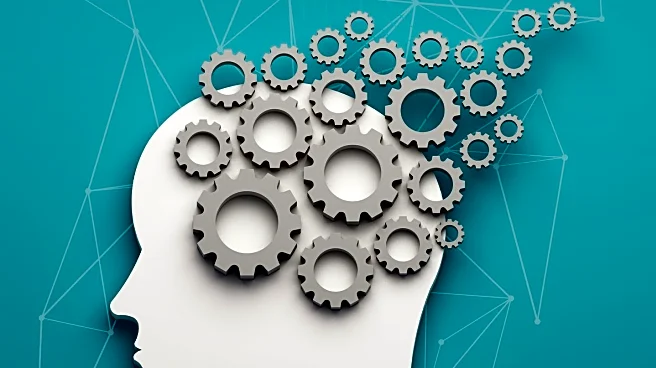What's Happening?
A recent study has provided compelling evidence that cognitive training can increase levels of acetylcholine, a brain chemical that typically declines with age. Conducted over 10 weeks, the study involved
participants aged 65 and older who engaged in rigorous mental exercises for 30 minutes daily. The results showed a 2.3% increase in acetylcholine levels in the anterior cingulate cortex, a brain area crucial for attention and memory. This increase is significant, as acetylcholine levels usually decrease by 2.5% per decade due to aging. The study, funded by the National Institutes of Health, compared two groups: one playing computer games like solitaire and Candy Crush, and the other performing cognitive exercises from the BrainHQ program. Only the latter group showed increased acetylcholine levels, suggesting that targeted cognitive training can effectively reverse some aging-related brain changes.
Why It's Important?
The findings of this study are significant as they suggest a non-pharmacological method to combat cognitive decline associated with aging. As the U.S. population ages, the prevalence of dementia and Alzheimer's disease is expected to rise, posing a substantial public health challenge. By demonstrating that cognitive training can increase acetylcholine levels, the study offers a potential strategy to enhance cognitive function and delay the onset of cognitive impairments. This could lead to broader adoption of cognitive training programs, potentially reducing healthcare costs and improving the quality of life for older adults. The study also supports the efficacy of brain-training programs, which have been met with skepticism regarding their impact on brain health.
What's Next?
The study's results may encourage further research into cognitive training as a preventive measure against cognitive decline. Healthcare providers might begin recommending such programs as part of a comprehensive approach to aging healthily. Additionally, the brain-training industry could see increased interest and investment, leading to the development of more sophisticated and effective cognitive exercises. Policymakers and public health officials may also consider integrating cognitive training into public health strategies aimed at addressing the challenges of an aging population.
Beyond the Headlines
The study highlights the potential for cognitive training to serve as a non-invasive intervention for age-related cognitive decline, which could shift the focus from pharmaceutical solutions to lifestyle-based approaches. This could lead to a cultural shift in how society views aging and cognitive health, emphasizing proactive and preventive measures. Furthermore, the study raises ethical considerations regarding access to cognitive training programs, as disparities in access could exacerbate existing health inequalities among older adults.









